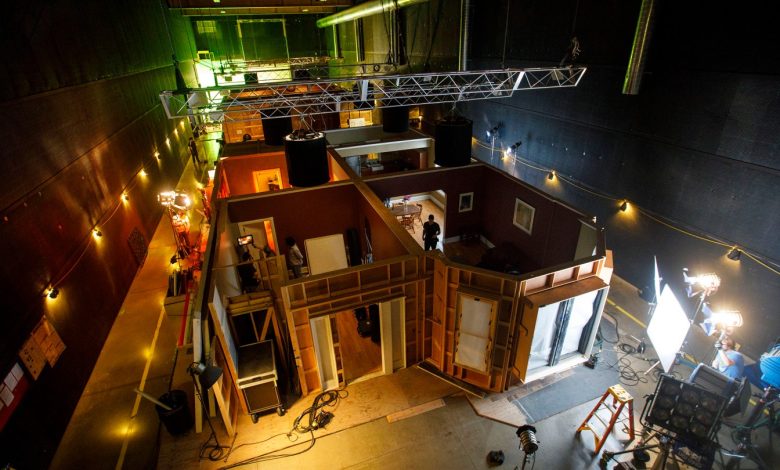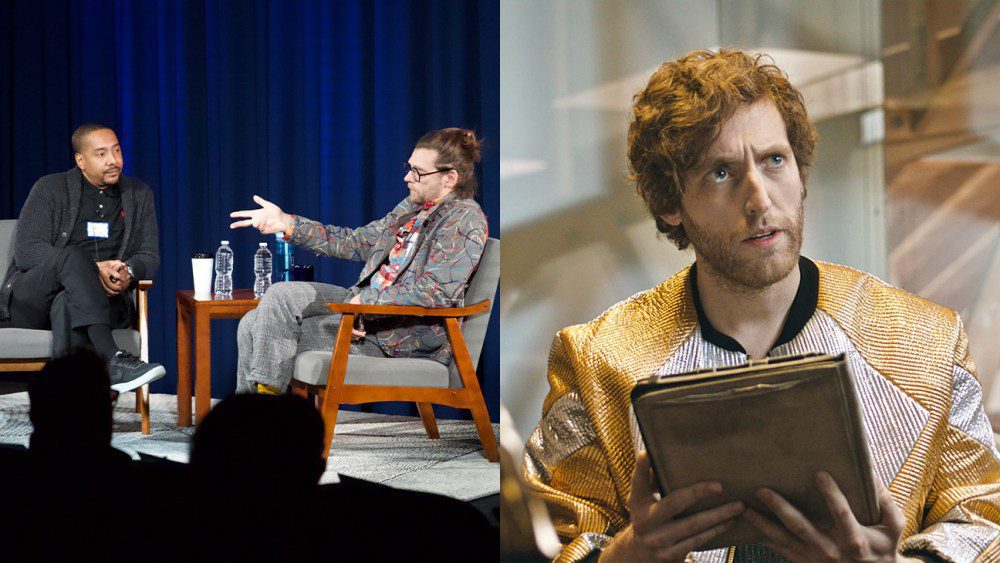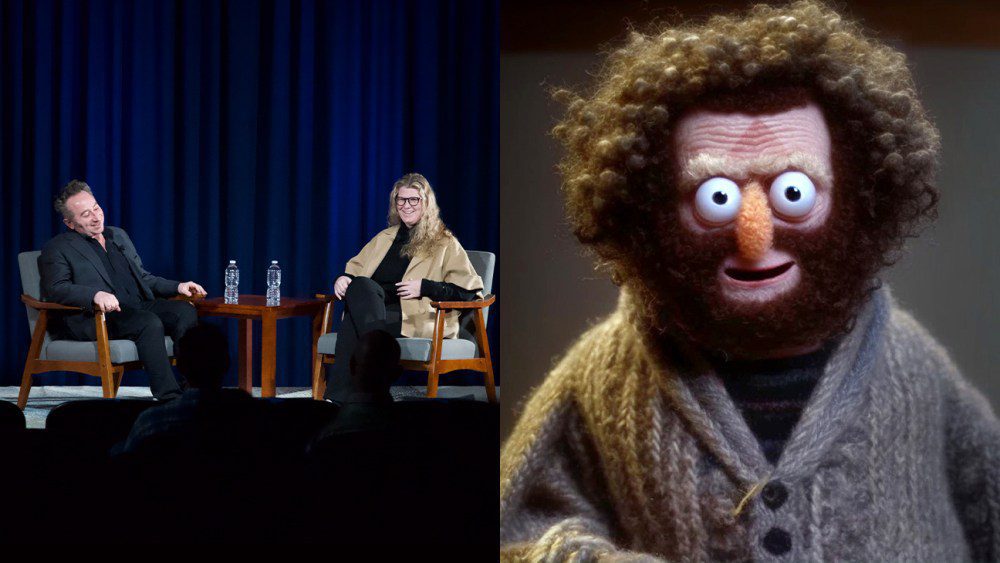DePaul University Hosts Chicago’s First AI-Centric Conference

At a time when Artificial Intelligence is seemingly everywhere – in the headlines, our search results, as well as post production tech applied to Oscar nominated films – educators, professionals and amateurs alike are still grappling with how to incorporate, avoid or welcome the technology into daily life.
The subject is complicated, but the technology is here and likely not going anywhere. As such, administrators at DePaul University’s award-winning School of Cinematic Arts organized an inaugural conference to address AI’s current and future impact on education and the arts, called, “AI in Film Education: At the Intersection of Human Creativity and Artificial Intelligence.”
Held at DePaul on Feb. 22 and the first-ever conference focused on AI in film education in the city of Chicago, the event is part of the school’s ongoing commitment to technological advancement, following innovations like the virtual production curriculum and the creation of DePaul Cinespace Studios, a 60K+ square foot facility where students gain practical, hands-on experience. Created in 2013 in collaboration with Cinespace Chicago Film Studios, the space is designed to prepare students for filmmaking careers by exposing them to real facilities, professional workflows and industry-standard equipment.
“It’s our responsibility to expose ourselves and to learn, so that we might be better teachers and better collaborators,” said conference organizer Daniel Klein, Professor and Director of Industry Engagement for the School of Cinematic Arts, in his opening remarks. The event’s programming covered a wide variety of related topics, from the ways in which AI is currently being taught at colleges, artistic, commercial and consumer use, and the ever-changing legalities and ethics involved.
Panelists and presenters consistently acknowledged the complexity of the subject and the technology at large, but emphasized the importance of education over evasion. AI is a tool, not a takeover.
“A lot of the kind of vocal conversation has been in resistance and pushing back. And I think we need to really be more attuned, more literate, more savvy, and more part of how this is all taking shape,” said University of Southern California professor Holly Willis, who is also Co-Director of the school’s AI for Media and Storytelling studio and developed the school’s first AI-centric classes.
Proceeding with caution and curiosity was a shared sentiment among panelists, along with the challenge of trying to keep up with the ever-evolving tech – a unique obstacle for educators currently teaching the subject.
“I would prepare a class and then the next week new improved technology would emerge,” recalled Northwestern University professor Özge Samanci. “I had the perfect nine students in [my first] class who discovered along with me. We were almost like a lab, we learned a lot together during that time.”
Willis also acknowledged the magic in that discovery, for educators, students and creatives at large. “Suddenly you’re creating something you’re not fully in charge of and it’s not doing the expected thing, it’s doing something unexpected,” she said. “The magic of that experience just really excited me on a creative level.”
The possibility for creative surprises was a uniting theme among the panelists, who also acknowledged the fact that the technology does not work without human involvement. In short, AI can’t push buttons.
“One thing that I’ve seen is that people who have training and skills that they brought to it, the work that they do with these tools is far beyond what the average person does,” said Scott Roberts, Associate Professor, Founder and Chair of Animation, DePaul University. “The way I approach it with students is that we’ve got to give them these foundational visual and creative skills and that’s what will hopefully elevate them.”
BAFTA-nominated filmmaker Oscar Sharp spoke passionately about how humans and humanity are still at the center of generative AI and will hopefully remain as such.
“All of our art is powered in some way by that sense of curiosity,” said Sharp, who made one of the first films using an AI-generated screenplay. “In the end, what we are doing is we are taking all of the culture we’ve made before and giving it back to ourselves. Being too anxious about it is a little bit of a waste of energy as far as I’m concerned. It’s more interesting to me to go, well, what can we do?”

TV director Dan Willis, a DePaul alum who’s directed episodes of Grey’s Anatomy, The Rookie, Matlock and Chicago Fire said he’s trying to help people understand how certain AI tools can help them all work smarter, like in the early development and research stages of production. “I’m trying to galvanize a team of people around so we can all be in the same direction,” he said. “I’m not necessarily trying to make all AI films, I’m more so trying to use the tool to help me communicate and also gather a lot of information really quickly in a way that might have taken a long time before.”
One buzzworthy AI innovation introduced at the conference is the generative interactive game, Public Eye from Wolf Games, where players help fictionally overworked law enforcement solve crimes. Industry veteran and Wolf Games CEO Andrew Adashek said the game was created with their belief that “the future of entertainment is interactive,” with audiences wanting stories catered specifically for them.
Along with the excitement about the possibilities for AI innovation and exploration, the subject is still a prickly one, especially when it comes to the ethical and legal issues involved. Litigation attorney Josh Weigensberg prioritizes protecting his clients as content owners and creators, but that current copyright law doesn’t yet fully address the scope of how the technology is being used. “Technology notoriously outpaces the law but where the tech is right now, the law is saying that the parts that the computer contributes are not yours,” he said.
Whether you are pro-AI or a naysayer, there is no denying the grey area at play. Conference panelists all admitted to grappling with the technology’s positive and negative potential but, similarly to how most groundbreaking technology has eventually been embraced over the last several decades, encouraged an open-minded approach and/or education.

“When I came into the business, desktop computing was starting, all these new things were popping up, and it was all about experimentation and play and learning it,” said Chicago-based creative director Erin Sarofsky. “I’ve watched the whole industry evolve. I say learn and embrace it. That doesn’t mean you have to use it everywhere, but it’s something that you definitely shouldn’t put your head in the sand on. We should know how to use it and at least the implications of it.”
As the conference wrapped up, one message was clear: AI is not an all-or-nothing proposition—it is a tool that, like any other, requires human guidance, creativity, and critical thinking. While the technology continues to evolve at a rapid pace, educators, filmmakers, and industry professionals alike are still figuring out how to embrace the challenge of learning, adapting, and shaping its role in a creative and collaborative process. By fostering open dialogue and hands-on exploration, events like DePaul’s inaugural AI in Film Education conference ensure that future storytellers are equipped not just with technical knowledge, but with the wisdom to wield these tools thoughtfully.
Source: Hollywoodreporter
HiCelebNews online magazine publishes interesting content every day in the celebrity section of the entertainment category. Follow us to read the latest news.
Related Posts
- YouTube Stars Make the Case for Why Their Shows Are Emmy-Worthy: “That’s the Future”
- Hugh Jackman Reveals One Thing Ryan Reynolds Isn't 'Great' At
- How to Stream ION TV Channel Online Without Traditional Cable for Free
- Cannes According to… Super Agent Jeremy Barber
- Son of Longtime ‘Letterman’ Producer Charged With Attempted Murder





